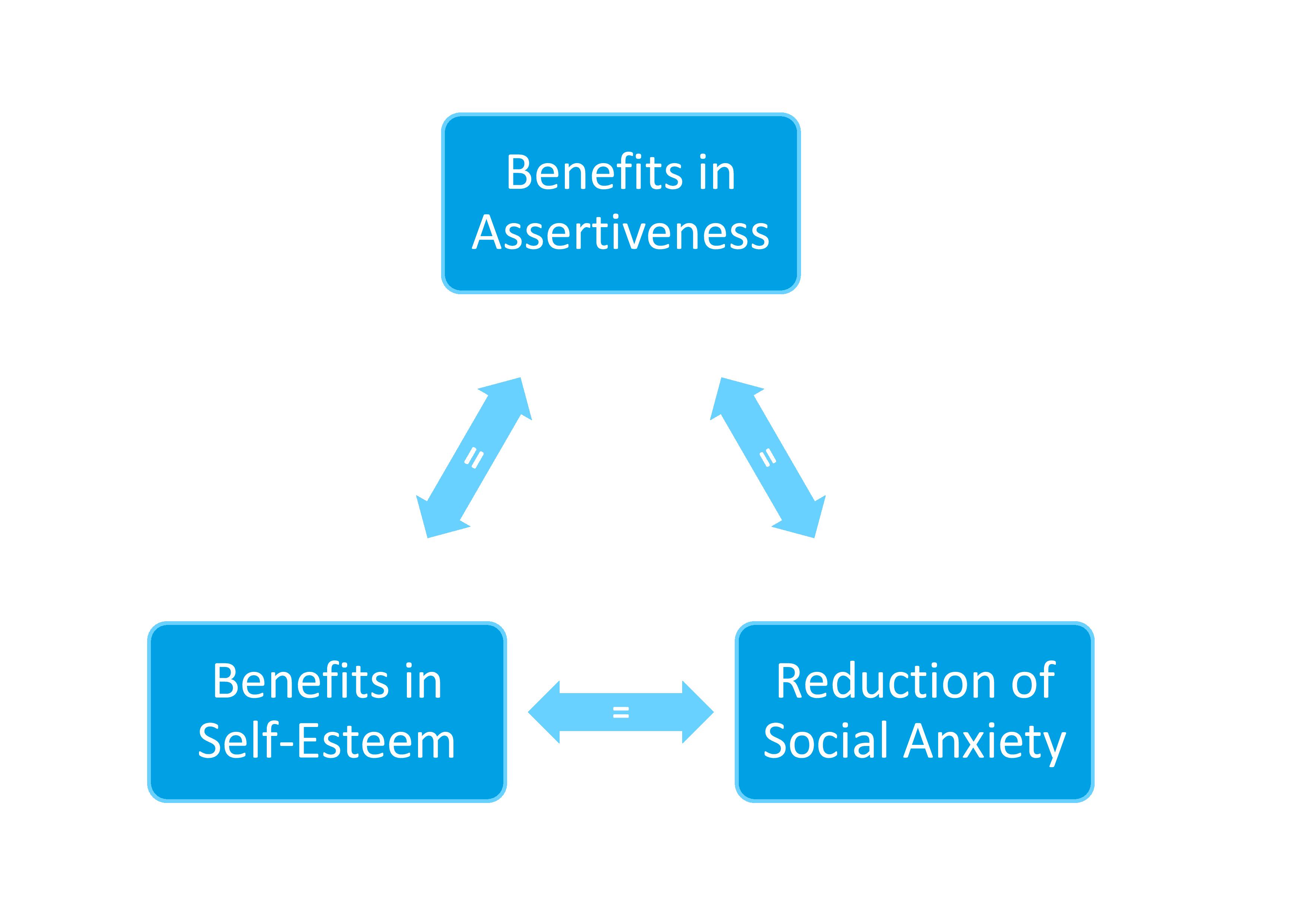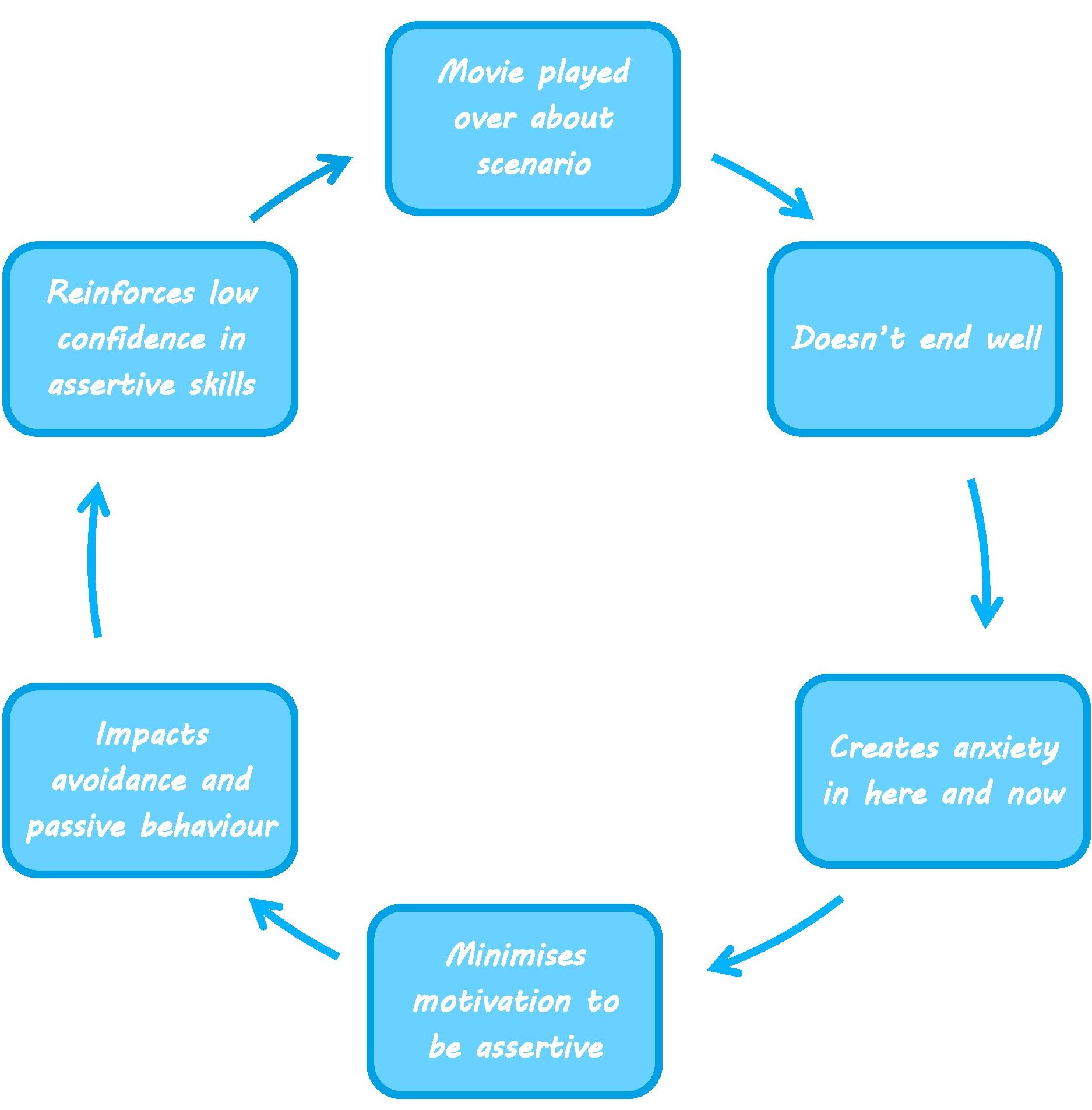Cognitive Model of Assertiveness | Formulation by Kim Leader
| Cognitive Model of Assertiveness (Leader) |   |
| Treatment Plan for Assertiveness |  |
According to the Diagnostic and Statistical Manual of Mental Disorders (DSM) assertiveness is not clinically diagnosable. Nonetheless, numerous research papers correlate it with social anxiety and self-esteem.

Self-esteem, also not to be found in the DSM, is still a recognised psychologically driven process impacting mental health and our sense of power in the world.
A lack of assertiveness reduces our ability to meet our needs, creates a sense of powerlessness and leads to increased anxiety.
The conceptualisation shared below is designed to be of benefit where assertiveness has been identified as a key factor that is impacting the client's wellbeing, and there may be a case for formulating this as the main current issue.
EXPLAINING THE MODEL
Beginning with Biopsychosocial Factors the therapist or individual seeks to mine information on areas such as early experiences, family, culture, friends, religious influences, educational experience and attainment, financial factors, health and role models. Additionally, personality traits such as neuroticism have an inverse relationship of assertiveness, while extroversion and conscientiousness present a linear relationship to assertiveness. That is to say that higher trait neuroticism leads to lower assertiveness and higher levels of extroversion and conscientiousness will oftentimes be indications of higher levels of assertiveness, generally speaking of course.
Do be careful not to fall into the trap of suggesting these things are therefore fixed. Research has been shown to demonstrate that assertiveness skills training has a positive impact on self-esteem and overcoming social anxiety. The aim of acknowledging them is to help reduce the self-criticism which might be apparent in the rumination about events section.
In the critical incidents classification, you will be gathering pertinent information regarding events which, in addition the Biopsychosocial may have influenced personal beliefs regarding assertiveness.
Examples of the kinds of beliefs include:
* Expressing my problems will burden others
* If I assert myself I will upset the other person and ruin our relationship
* It will be terribly embarrassing if I say what I think
* If someone says "no" to my request it is because they don't like or love me
* I shouldn't have to say what I need or how I feel: people close to me should already know
* It is uncaring, rude and selfish to say what you want
* It will all work out in the end
* People should keep their feelings to themselves
* If I express my vulnerability people will think I'm weak, ridicule me or take advantage
* If I accept compliments from someone it will mean I am big headed
* They will say no to my request, and I couldn't bear it
* They will be offended, or angry if I offer feedback
* I will say things too harshly, and feel guilty or in some way bad about myself
* Being assertive hasn't gone well in the past, therefore it will not go well in future
* I'll go blank, struggle to articulate myself or mess up my words
* I can't say "no"
* I must offer reasons or excuses to justify my behaviour
* Being small and quiet will keep me safe
* People will not listen to me
With beliefs such as these, or similar, we tend to make predictions regarding being assertive in particular situations.
Resultantly anxious physical symptoms may be triggered such as shortness of breath; dizziness; dissociation; sleep problems heart palpitations; chest pain; muscle tension; headaches; nausea; need for the toilet; becoming hot; sweaty and changes in vision, to name but a few.
Resultant passivity of behaviours exhibited. These may comprise of refraining from saying what is truly felt, to agree while internally disagreeing, always showing one's 'happy face', avoidance of certain people, actions, places or situations as well bodily cues such as avoiding eye contact, fidgeting and speaking in a quiet tone.
As self-fulfilling prophecy of passive behaviours confirms the predictions, provides indicators of our worth. A lack of assertion increases likelihood of others crossing personal boundaries, reducing our ability to meet our needs from others and reinforces low worth, while also endorsing the original assertive beliefs that were held.
A tell-tale sign of lacking assertiveness is a repetitive rumination about the previous events encapsulated by resentment, thoughts that "I should have done or said X", "they shouldn't have said or done X", "next time I'll do such and such".
I believe that the purpose of these ruminations is an attempt to create a change in behaviour.
However, unless these changes actually occur, the ruminations will continue to cause anger being projected outward as well as inward, increased self-criticism, and diminished self-worth.
Having refrained from confronting the fear of being assertive in the previous opportunity, our confidence is weakened to it in the next one, creating a sense of powerlessness and adding to anxiety.

For comments and queries please feel free to contact me at info@possie.co.uk

Possibilities Unlimited Hypnotherapy
Therapy Room: 9 Bartholomews, Brighton, East Sussex, BN1 1HG
Email: info@possie.co.uk
Mobile: 07949989986
*Disclaimer: Results may vary from person to person.